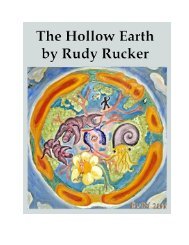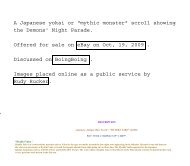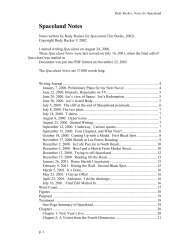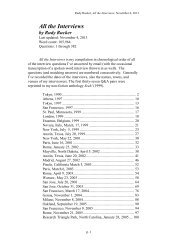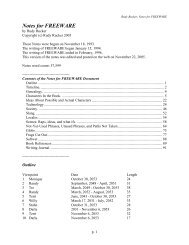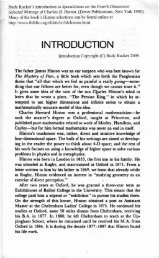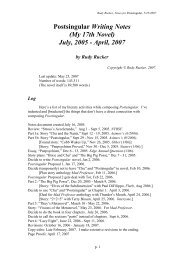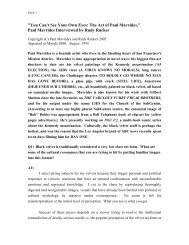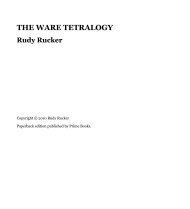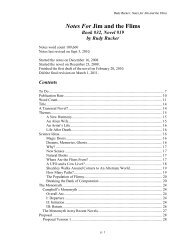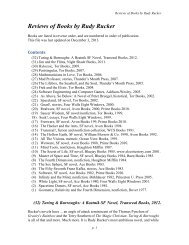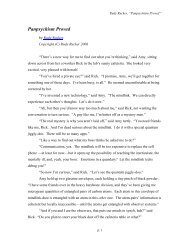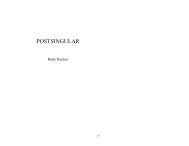Notes for the Lifebox, the Seashell, and the Soul - Rudy Rucker
Notes for the Lifebox, the Seashell, and the Soul - Rudy Rucker
Notes for the Lifebox, the Seashell, and the Soul - Rudy Rucker
You also want an ePaper? Increase the reach of your titles
YUMPU automatically turns print PDFs into web optimized ePapers that Google loves.
<strong>Notes</strong> <strong>for</strong> The <strong>Lifebox</strong>, <strong>the</strong> <strong>Seashell</strong>, <strong>and</strong> <strong>the</strong> <strong>Soul</strong>, by <strong>Rudy</strong> <strong>Rucker</strong><br />
(ii) If P(a) doesn’t halt, <strong>the</strong>n OP(a) halts at ó.<br />
And we say that P has an oracle iff <strong>the</strong>re is some OP which is an oracle <strong>for</strong> P.<br />
I won’t use oracles <strong>for</strong> anything in this appendix, but as <strong>the</strong> notion of oracle seems<br />
more intuitive than <strong>the</strong> notion of a solvable halting problem, I use it in <strong>the</strong> main text. Be<strong>for</strong>e<br />
moving on, I’ll show that <strong>the</strong> two notions are really equivalent.<br />
Proposition. P has an oracle iff P has a solvable halting problem.<br />
To see <strong>the</strong> truth of this proposition in <strong>the</strong> <strong>for</strong>ward direction, note that if P has an<br />
oracle OP, you can use OP as a black box inside a new computation HP such that HP(a)<br />
outputs 0 as soon as OP(a) halts at ó, <strong>and</strong> HP(a) outputs 1 as soon as OP(a) halts at any o<strong>the</strong>r<br />
value. To see <strong>the</strong> truth in <strong>the</strong> reverse direction, you can cobble toge<strong>the</strong>r an OP by putting<br />
both HP <strong>and</strong> P inside a black box. Given an input a, you first feed it to HP. If HP(a) = 0, let<br />
OP(a) return ó. If HP(a) = 1, <strong>the</strong>n run <strong>the</strong> computation P(a) until it halts at some b <strong>and</strong> let<br />
OP(a) = b.<br />
Drafts For <strong>the</strong> Ending<br />
[Aug 25, 2004. I was going to call this last section “Wake Up”.]<br />
Although it may not seem like it, one of my goals in writing this book has been to<br />
liberate myself from computers. So why have I been writing about <strong>the</strong>m at such length? I<br />
wasn’t quite able to <strong>for</strong>mulate my logic until I found <strong>the</strong> following remark by Marshall<br />
McLuhan. Though most of us imagine McLuhan to be a cheerleader <strong>for</strong> progress, <strong>the</strong><br />
opposite was <strong>the</strong> case.<br />
“I am resolutely opposed to all innovation, all change, but I am determined to<br />
underst<strong>and</strong> what’s happening. Because I don’t choose just to sit <strong>and</strong> let <strong>the</strong> juggernaut roll<br />
over me. Many people seem to think that if you talk about something recent, you’re in favor<br />
of it. The exact opposite is true in my case. Anything I talk about is almost certainly<br />
something I’m resolutely against. And it seems to me <strong>the</strong> best way to oppose it is to<br />
underst<strong>and</strong> it. And <strong>the</strong>n you know where to turn off <strong>the</strong> buttons.”<br />
In his later life, McLuhan rephrased his adage “<strong>the</strong> medium is <strong>the</strong> message” by saying<br />
that <strong>the</strong> best way to underst<strong>and</strong> <strong>the</strong> effects of a new technology is to look not at <strong>the</strong> figure,<br />
but at <strong>the</strong> ground. Thus, ra<strong>the</strong>r than talking about what people use computers <strong>for</strong>, we might<br />
look at how <strong>the</strong>y change people’s behavior.<br />
Think of <strong>the</strong> time you spend upgrading <strong>the</strong> software on your machine. Think of <strong>the</strong><br />
toll <strong>the</strong> hours at <strong>the</strong> screen take on your wrists <strong>and</strong> your back. Go into a coffee shop <strong>and</strong> look<br />
at <strong>the</strong> people isolated behind <strong>the</strong>ir laptop screens. Walk down a street <strong>and</strong> see blank-faced<br />
people pecking at <strong>the</strong>ir wireless gizmos. Imagine a world where your time was your own.<br />
When I say that everything in <strong>the</strong> world can be viewed as a computation, I’m not<br />
saying that PCs are as good as reality. Far from it. Yes, universal automatism teaches us that<br />
<strong>the</strong>re’s a common ground by which to compare nature to PCs. But on this common ground,<br />
we can readily see that <strong>the</strong> natural world is incalculably more powerful <strong>and</strong> interesting than<br />
<strong>the</strong> odd flickering boxes we’re wedded to in <strong>the</strong> era Y2K.<br />
The air is a gnarly ocean; <strong>the</strong> leaves dance on <strong>the</strong> trees.<br />
Have pity on your tired eyes <strong>and</strong> aching back. Do something nice with your body.<br />
Who am I to tell you what to do? Well, actually this advice is <strong>for</strong> me.<br />
And look into your head. Underneath <strong>the</strong> planning <strong>and</strong> resenting <strong>and</strong> wanting <strong>and</strong><br />
worrying is <strong>the</strong> river of thought. Look at it like you’d watch <strong>the</strong> ripples in a stream. It’s<br />
beautiful. Let go of plans <strong>and</strong> expectations.<br />
p. 99



